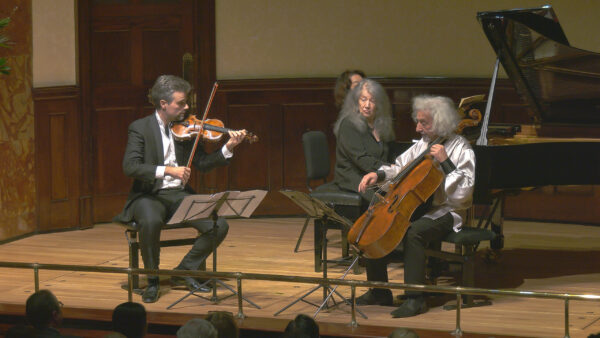 United Kingdom Bach, Haydn and Mendelssohn: Mischa Maisky (cello), Martha Argerich (piano) Yossif Ivanov (violin). Wigmore Hall, London. 6.2.2025. (CSa)
United Kingdom Bach, Haydn and Mendelssohn: Mischa Maisky (cello), Martha Argerich (piano) Yossif Ivanov (violin). Wigmore Hall, London. 6.2.2025. (CSa)

JS Bach – Cello Suite No.1 in G BWV1007; Partita No.2 in C minor BWV 826
Haydn – Piano Trio in G HXV/25
Mendelssohn – Piano Trio No.1 in D minor Op.49
There was a buzz of nervous anticipation in the crowded lobby of the Wigmore Hall as ticket holders waited to take their seats and a long line of hopefuls queued for returns, all waiting to hear one of the world’s most acclaimed concert pianists of her generation play alone and together with friends in a rare London appearance. Rare because the legendary Martha Argerich has not given a solo recital at Wigmore Hall for over three decades. Nervous anticipation because the 83-year-old Argentinian pianist does not enjoy the best of heath and has earned a reputation for last-minute cancellations. Another potential uncertainty was the attendance of celebrated Latvian-born Israeli cellist Mischa Maisky, now aged 77, who has only recently made a remarkable recovery after a severe spinal infection which left him nearly paralysed.
Maisky and Argerich first met at the Vence festival in the South of France in 1975 and have been performing together for almost 50 years. They enjoy a special chemistry – some describe it as telepathy – when playing together. We were to have heard the duo play cello sonatas by Beethoven, Schubert and Greig, but a late change of programme felicitously led to the addition of award-winning Belgian violinist Yossif Ivanov who, at 38, is considerably younger than his 1699 ‘Lady Tennant’ Stradivarius. It also resulted in an opportunity to hear individually from Maisky and Argerich.
Each half of the concert opened with some solitary Bach. Cutting an almost biblical figure with his mane of white hair, goatee beard and flowing white shirt, Maisky came on first to give a sonorous account of Cello Suite No.1 in G. The Prelude, exquisitely shaped and subtly modulated, flowed like water, while the delicately ornamented Allemande gently swayed back and forth as if driven by a light breeze. A joyful Courante – taken quite fast- was followed by a searingly tender Saraband, a pair of playful Minuets and a vigorous, lusty Gigue.
Joined on the platform by Argerich and Ivanov to play Haydn’s well-known ‘Gypsy Rondo’ Piano Trio in G, violin and cello deferred sensitively to Argerich’s dominant piano role, while all the while maintaining excellent musical teamwork. Warmth, sweetness of tone and perfect balance between the three players characterised the first movement Andante and the gently undulating Poco adagio, but one’s spirits truly soared during a fast-paced and dazzlingly accomplished Rondo all’Ongarese, once described by the late Donald Tovey as ‘the loveliest thing Mozart never wrote’.
The second part of the programme began with what was to become the highlight of the evening – a rare and unforgettable performance by Argerich alone of Bach’s Partita No.2 in C minor. From the grand but unlaboured opening Sinfonia and finely articulated Allemande to the serenely introspective Sarabande, bright, percussive Rondo and sprightly Capriccio. Argerich combined profound emotional insight with flawless technical ability. In short, here was an exhibition of supreme artistry.
After the balm of Bach, the three players reunited for the last formal item on the programme, Mendelssohn’s effervescent D minor trio. The first movement burst forth, radiant in texture and superbly paced, giving way to the second movement Andante, a heart-melting song without words. An irrepressibly whimsical Scherzo and a glittering Finale, a sprinkling of Mendelssohnian fairy dust, brought the entire audience to its feet. As an encore, Schubert’s calming song, Du bist die Ruh (You are the peace), set to Rückert’s poem and adapted for trio, provided the perfect nightcap.
Chris Sallon
